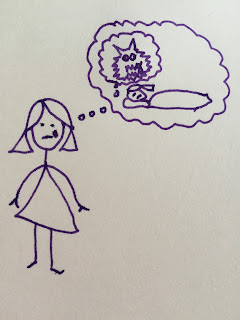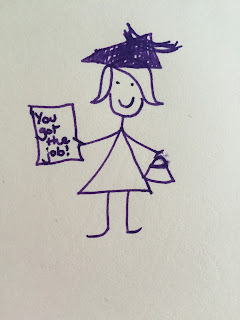"Dear Stranger is a collection of inspirational, honest and
heartfelt letters from authors, bloggers and Mind ambassadors to an imagined
stranger. Insightful and uplifting, Dear Stranger is a humbling glimpse into different
interpretations of happiness, and how despite sometimes seeming unobtainable
happiness can, in the smallest of ways, become and achievable goal..."
...And when I read that summary
provided on the Penguin website it seems that with the positive messages in the
book, provided by the collection of writers, many of whom I greatly respect,
that happiness which – to me – so often – does seem unattainable (or it does
when I define it as being the end of depression) – starts to feel less vaporous.
Reading further on Mind’s
website, the book describes the letters as a collection of the thoughts of a number of (named) authors, who “offer
their innermost thoughts on what happiness means to them.”
After a
lovely meeting today with someone who represents one of the clients which the
company I work for works with to talk about what we are doing as a firm about
our approach to raising awareness and lessening stigma around mental health, I
offer this small missive to the world of the city, as my wish for happiness in
the strange world in which I work.
Dear stranger,
This
is a story about two little girls who grew up. Both began life as little girls
who liked running around, reading stories and singing nursery rhymes. One of
the little girls had bad nightmares, though, and found sleeping often
terrifying. The other little girl loved imagination and reading and creating
stories, and could sing nursery rhymes with all the actions almost as soon as
she could talk.The little girls went off to school. One of the little girls loved school, she loved painting and writing and playing hopscotch. She learned to wink from the dinner lady Mrs. Keene and loved using it as part of her cheeky personality. The other girl cried when she was dropped off at school. She didn't want to leave her mother and spend the day in the company of other children or adults who were not safe. She sometimes got horrible headaches and couldn't wait for the day to be over so she could go home.
The girls went to junior school. The first little girl wrote a poem about a daffodil which was put up on the wall. She learned to play the piano and the trumpet, she sang songs in the playground at break time and played ball games and elastic band games and cats' cradle. She made lots of friends and had great fun learning to roller skate, ballet (and then giving up ballet because it was boring to "point and close" on and on), ice skate, horse ride and take part in the school's winning speech and drama group. She could run and swim really well. Breast stroke was her best stroke. Once she showed all the other girls how to do it because her teacher singled her out as one of the best swimmers.
The second little girl was scared of the playground. She was made to stand on the playground wall all break time by three older girls and wasn't allowed to get down. It happened every playtime and in the end, she pretended to be ill and asked for permission not to go to school. She didn't say why. Her parents didn't find out for a while that she was being bullied. Aged nine it happened again with a different bully. The second little girl thought it was probably get fault, because she had, after all, been bullied before. She started to believe there must be something wrong with her. She also couldn't breathe very well and often felt too tired to go to school. Eventually she was diagnosed with asthma and started to have trouble with sports.
At senior school the first little girl made more friends and enjoyed the new clubs, the different subjects and the new uniform. She made sure she understood the right tights to wear, the right shoes, bag and everything else. She went to sleepover parties and pool parties and all sorts of other parties. She met boys at the boys' school, and enjoyed life in the "big" school. She found it exciting to be growing up. She enjoyed swimming and drama, she loved going to the cinema. She didn't always work hard at all her subjects but she still did pretty well in her school exams, especially in English and Latin, her favourite subjects. Her teachers told her she was doing well and could do very well. She knew she could do well enough in the subjects she cared about and she didn't try too hard at the other subjects because she didn't want the teachers to push her too much and stop her having fun.
The second little girl found it hard to adjust to big school. She got very tired and overwhelmed by all the new teachers. It was hard to learn every different teacher's sets of rules. It was hard to manage all the homework. She found it frightening and tiring to be growing up. It was hard. She found homework confusing and exhausting at times. She didn't get top marks in her exams. Sometimes she did badly. Her teachers told her she wasn't working hard enough. She needed to work harder. She tried to please the teachers but sometimes she found it too hard and because she didn't concentrate in lessons or understand everything, and because she was often too ill with asthma she had to go to hospital and she fell behind.
So, reader, what do you think happened to those two little girls? As you have probably guessed, because you are wise and discerning, and used to stories like these, those two little girls were one and the same. In fact those two little girls grew up to be me.
Now you will say to me, "Writer, you have not told a tale of happiness, which I thought was your purpose?" And I will say this to you: I read my own story back again and again, and I remind myself that I am the happy little girl alongside the sad; I am the confident high achiever alongside the shy, fearful and tearful teenager. I am the woman who has made a successful career in spite of suffering episodic depression, anxiety and trauma. I am she.
When I need a reminder of the definition of happiness, I can look at parts of my own life. (And when I want a reminder of sadness and hurt, I can do the same, but enough of that for now.) I shall celebrate the happiness when I can, and be thankful for every happy moment past, present, and yet to come. And throughout my life, as you have seen, there have been threads and strands and patches of happiness, alongside any sadness you may see or know of. So, please, dear stranger, remember that. And lastly, I wish a wish for you: yards of happiness of your own, among all the threads of sorrow. Keep looking backwards and forwards for happiness because it can and will find you, somehow, somewhere, and treat others with the kindness that you try to show yourself.
When I need a reminder of the definition of happiness, I can look at parts of my own life. (And when I want a reminder of sadness and hurt, I can do the same, but enough of that for now.) I shall celebrate the happiness when I can, and be thankful for every happy moment past, present, and yet to come. And throughout my life, as you have seen, there have been threads and strands and patches of happiness, alongside any sadness you may see or know of. So, please, dear stranger, remember that. And lastly, I wish a wish for you: yards of happiness of your own, among all the threads of sorrow. Keep looking backwards and forwards for happiness because it can and will find you, somehow, somewhere, and treat others with the kindness that you try to show yourself.
With love, Jessica























